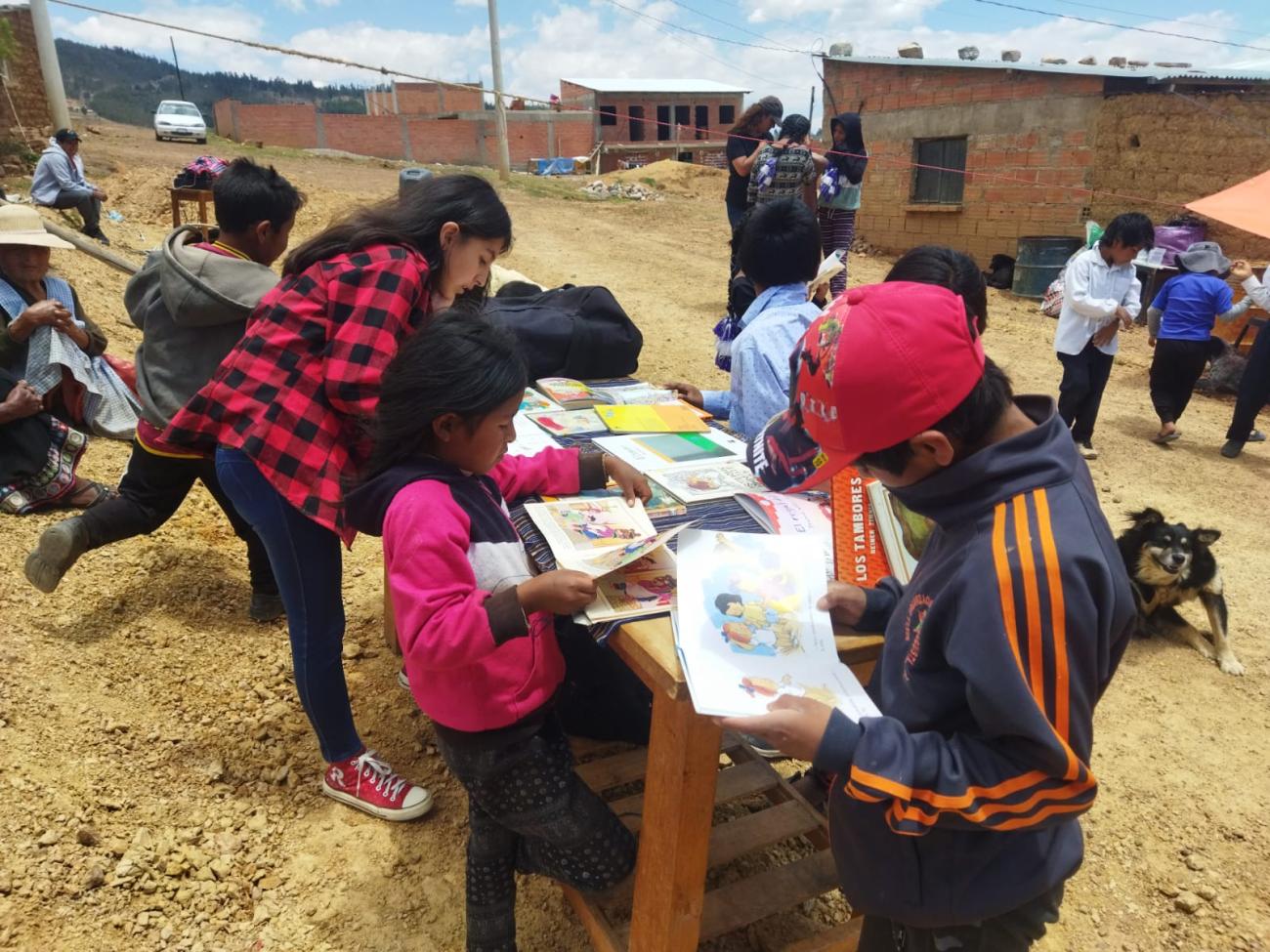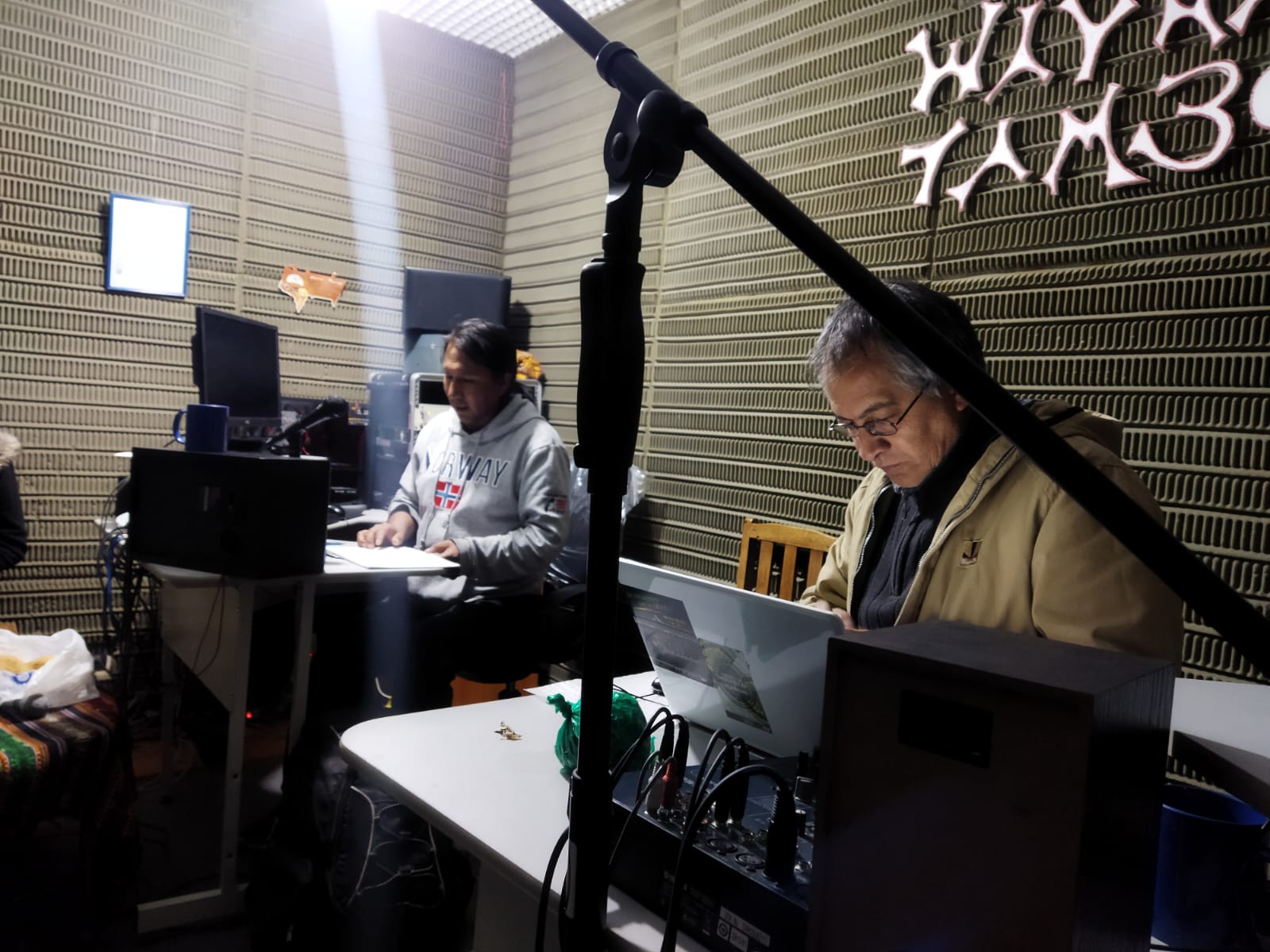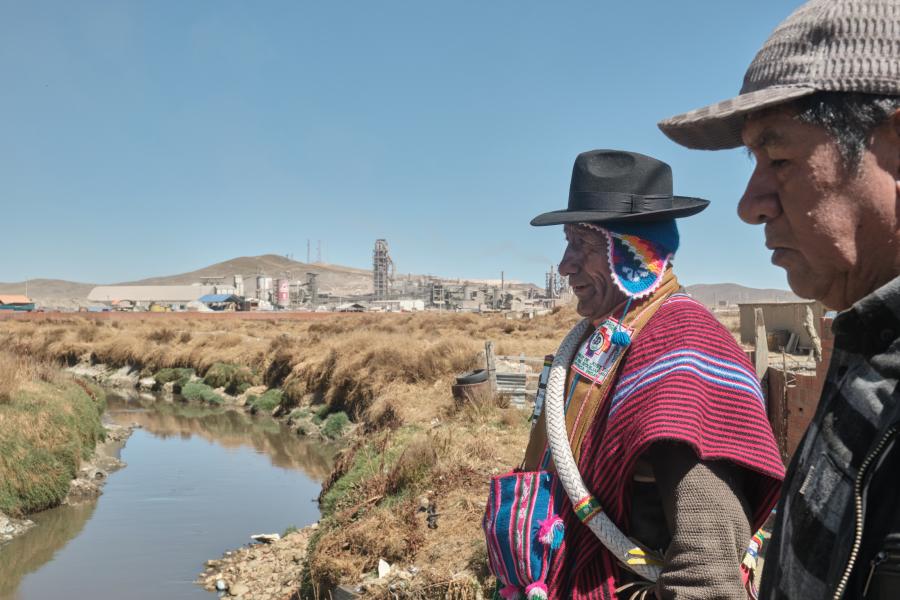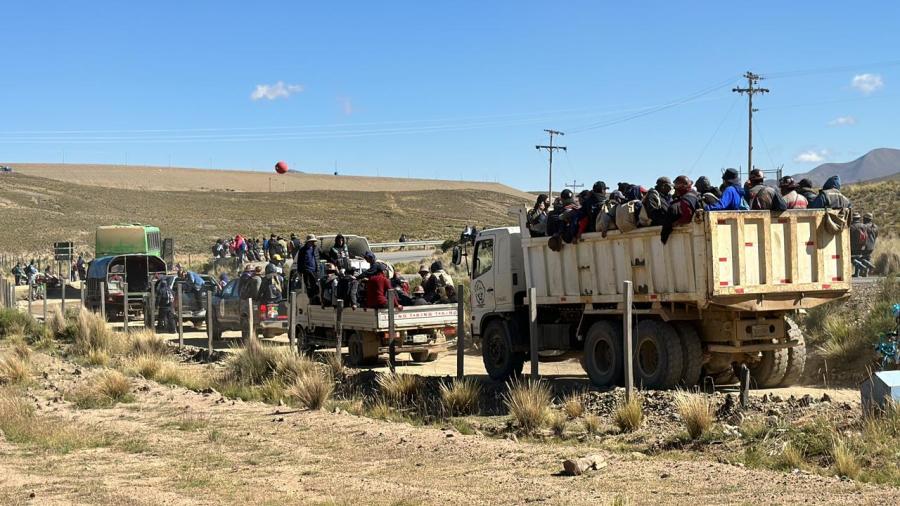
By Wayna Tambo – Red de la Diversidad
Wayna Tambo – Diversity Network is located in the city of El Alto, department of La Paz. It is a mid-sized city inhabited mostly by migrant populations who maintain a strong connection with the countryside. A large part of the population identifies as Aymara People.
Wayna Tambo was founded in January 1995 as a community and neighborhood cultural center and has established a massive presence through cultural events, radio programs, and publications. From our beginnings, we have worked to strengthen our primarily Aymara Indigenous roots in urban spaces, connecting the people of the countryside and the city. In 2002, we founded our own intercultural community radio station, Wayna Tambo. The station played an important role during the Black February conflicts and the Gas War of 2003, serving as a voice of the resistance struggle of the people of El Alto.
Three years later, in 2006, the cultural space and community radio station, Yembatirenda, was started in Tarija, marking the beginning of what we now know as the Diversity Network. In 2009, Sipas Tambo – Diversity Network was established in the departmental capital city of Sucre, a Quechua-speaking community. This project consolidated territorial cultural work in various neighborhoods and established a community radio station, Sipas Tambo, which became the third radio station to join the Wayna Tambo Diversity Network.
The three radio stations are owned by the Diversity Network and are accountable to its decisions. The Network relies on the Wayna Tambo Foundation for legal and institutional reasons, as it does not have legal status. Each station holds legal concessions as private radio stations, which allows for greater broadcast reach. For bureaucratic purposes only, they are registered in the names of individual Network members.
In 2018, we launched the digital newspaper Los Muros and the Wayna Tambo YouTube channel. These actions contribute to our core mission of fostering and revitalizing community in Bolivia. Our purpose is framed within the perspective of bien vivir (living well) and plurinationality as an equitable form of diversity.
Our work is informed by the active participation of diverse stakeholders, ranging from urban neighborhoods to organized communities that defend the life of their territories throughout the country. We seek to influence the co-management of public resources and the common good, as well as the strengthening of the links between urban and rural areas. All of this is based on decolonizing, decommodifying, anti-patriarchal, and de-anthropocentric perspectives, which we implement through cultural, artistic, educational, communicative, and economic strategies and actions.
The Wayna Tambo – Diversity Network team is made up of colleagues who belong to and identify with the Aymara, Quechua, and Guaraní Peoples through their native language and the territory they inhabit. We partnered with Cultural Survival to implement a communications strategy aimed at bringing the topics of transition minerals and the energy transition in Bolivia to the audiences of our radio stations and digital platforms.
In Bolivia, as part of the Lithium Triangle, it is necessary to open the debate on mining activity, the exploitation of raw materials, their industrialization in our territories, the situation of affected communities, territorial dispossession, health impacts, and other consequences.
With the support of Cultural Survival, meetings were held with communities suffering the consequences of mining activities. The meetings allowed us to engage with them and for them to convey what is happening in those territories, amplifying the reach of their voices to other spaces and regions. Additionally, Wayna Tambo was able to replace our original transmitters, which were 10 years old. This change allowed us to amplify and improve our transmission signal, in addition to optimizing our reach on digital platforms.

These encounters with Indigenous Peoples and Nations, as well as sugarcane harvesters, campesinos, and farmers, have made it possible to shed light on the problems affecting them. The issues—which also impact cities—include water and food crises, soil and water pollution, land dispossession, community displacement and expulsions resulting in forced migration, lack of institutional protection, and noncompliance with the laws that protect their territories.
Illegal mining is destroying lives in the communities, with no sufficient or adequate response from the State to the cries for help coming from the affected territories. We still don't know how to solve this problem, what paths to take, or who to work with. And right now, the entire world is talking about the so-called green energy transition, in which Bolivia, given its lithium reserves, is set to play a leading role.
One of the sisters helping to translate at our meetings into Aymara and Quechua, Doña Marina, told us, “It's very complicated to translate what experts tell us about energy transition and transition minerals. There are no words in our language to describe what they're saying. If it's already very difficult for me, imagine for the communities that will be affected. It pains me greatly; it saddens me to know how my brothers and sisters suffer. But this won't stop because people are deaf. They only want wealth, money; their minds are focused on making money without caring about others. I hope that when they hear the voices of their brothers and sisters, their hearts will feel for them, and we can do something to change.”
As to how we can take action, Aurelia offered, “There are many threads we can unravel. First, a greater dialogue about what mining means. We still see the miner from the great mining struggle of the ‘70s, ‘80s, and even the ‘90s, but now we no longer know how that sector is composed. When we talk about illegal mining, we're talking about criminals, about private entrepreneurs who are taking advantage of regulations, about private transnational companies that are operating here in the country camouflaged as the mining sector. So, first, it's necessary to talk about what the mining sector is today and what it represents. We ask if there is a real intention, today, to lift the country out of poverty or rather, is there a process of capitalist bureaucratization of the mining sector? The second is to talk about what areas we are willing to sacrifice in the country and why we are going to sacrifice them. And the third is to talk about how we are paying for mining with the bodies of children and women, because we don't have health centers that investigate the consequences of mining pollution. We must begin to talk about these three things and then talk about other topics.”
We recognize ourselves in these urgent and necessary encounters with territories, communities, and people who struggle, resist, and exist in their spaces. From there, they nurture and defend life, water, land, and forests, and show us other paths that gradually build the horizon of bien vivir: a harmonious existence with and among Indigenous Peoples and Nations alongside our Mother Earth.
We conclude with the words of Mary Luz from the Totoral Chico community of the Ayllu Acre Antequera: “Our parents died with that dream of living in freedom, of living a peaceful and dignified life. It hasn't happened [yet], but we will not falter. Rather, we will stand strong, even firmer, until the end. May our voice echo and be heard in Bolivia and throughout the world, saying that we will not falter.”
In 2024, Wayna Tambo – Diversity Network was supported by the Indigenous Community Media Fund, which provides opportunities for international Indigenous radio stations to strengthen their infrastructure and broadcast systems and creates training opportunities in journalism, broadcasting, audio editing, technical skills, and more for radio journalists from Indigenous communities around the world. In 2024, the Indigenous Community Media Fund supported diverse communities with 57 grants totaling $480,000 to Indigenous community media outlets in 25 countries across the Americas, Africa, and Asia, including Argentina, Bangladesh, Bolivia, Botswana, Brazil, Chile, Ecuador, Colombia, the Democratic Republic of Congo, El Salvador, Guatemala, India, Kenya, Mexico, Nepal, Nigeria, Peru, the Philippines, Senegal, South Africa, Tanzania, the United States, Venezuela, and Zimbabwe.
All pictures courtesy of Wayna Tambo - Red de la Diversidad


